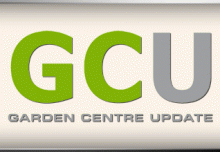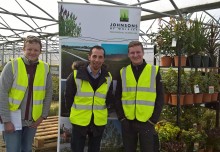 Those of you who read last month’s column on photography will recall that I promised a new picture of myself. Well, here it is, and you will probably agree that mine is a perfect face for … radio. Which is just as well because this is the subject of this month’s column on how to raise the profile of your garden centre using the media.
Those of you who read last month’s column on photography will recall that I promised a new picture of myself. Well, here it is, and you will probably agree that mine is a perfect face for … radio. Which is just as well because this is the subject of this month’s column on how to raise the profile of your garden centre using the media.
There are literally hundreds of local and regional radio stations and, in the vast majority of cases; they welcome submissions from their catchment area about ideas for possible interviews.
In previous columns we have talked about how to write press releases and the common pitfalls and also about the importance of timing. It may seem like an unnecessary point to make but most local radio stations want to interview someone. So this month we are focussing on how to approach your local radio station and, assuming that an interview has been arranged, how best to prepare for it.
Let’s get some basic points agreed. If you are putting forward someone for a local radio interview do make sure that they speak clearly. Regional accents are terrific, particularly if it is a local one. But not someone who mumbles, hmms and arrs or ends every sentence with “know what I mean?”
There are two different types of radio interview: live and recorded. They can take place in four different locations: in the radio station studio, in their radio car, on the telephone or on location. The day I am writing this column I have just completed a seven-minute live lunchtime interview on Edinburgh’s Talk 107.
The subject was the Briggs & Stratton Britain’s Best Park competition. Last week we issued a press release on behalf of our client announcing that the search is on for the winner of the 2008 competition and the Edinburgh interview was the second and others are coming in thick and fast.
When we put out a press release we make it clear that someone is available for a telephone interview. Preparation is the key to a good radio interview. As an aide-memoire always write down a small number of key bullet points you want to make in the interview.
Politicians are past masters at this. They know the three or four key points they want to make and they get them over regardless of the questions the journalist asks. Most local radio interviewers are fairly gentle – we are not dealing with John Humphrey’s or the radio equivalent of Jeremy Paxman. But do answer their questions and, in so doing, build into your answers the points you want to make.
The four key points I wanted to get over in my Edinburgh interview were:
- Briggs & Stratton sponsor Britain’s Best Park and make petrol engines for lawnmowers.
- We want your listeners to nominate their favourite local park and then I listed the key criteria upon which judges make their decision as to which will be Britain’s Best Park 2008.
- Explain how listeners can get the entry forms – give a warning that they will need paper and pencil then give it out later in the interview.
- The prize is a Briggs & Stratton powered top of the range lawn tractor to be used in the winning park.
It was a long, chatty interview and during the course we discussed all sorts of different points but these four key issues were taken up by the interviewer.
Local radio stations are not there to provide your garden centre with free on-air advertising. I think that in my seven minute interview I mentioned the Briggs & Stratton name no more than four or five times. I know the programme presenters also gave out the name at the start and end of the piece. That is perfectly adequate.
So let us imagine that Smith’s Nurseries in Anytown are running a demonstration in your centre on how to make a beautiful hanging basket. You have telephoned the news desk or forward planning department at the Anytown Radio Station, told them the details and confirmed it all by e-mail. They are telephoning you for an interview – it doesn’t matter if it’s live or recorded.
Here would be my four key points;
- What, when, where and at what time it is taking place. Is there any entry charge or is the money going to charity?
- Who is giving the demonstration? Has he or she ever won competitions for their hanging baskets and, if so where and when?
- Why is Smith’s Nurseries running the demonstration? You will know the answer but try not to be totally commercial. Perhaps say that many gardeners know their precise colour schemes and grow on cuttings etc. to meet this. The event will help them grow better hanging baskets. Of course you do sell everything the visitors will need and you are giving away a free top-tips guide prepared by the demonstrator.
- The media love statistics – try and give some examples. Go online and find some statistics about the popularity of hanging baskets in the UK.
During the interview you do need to answer the journalist’s questions but make certain you get your points over. Finally, be relaxed and chat away. Your voice will sound more natural and positive if you enjoy the experience and stay in control of the situation.
If it is a telephone interview make sure you are in a quiet office. Don’t fiddle with coins or tap a pencil on your desk. Tell your colleagues not to disturb you during the interview. Take other telephones off the hook and switch off your mobile. Take a note of the name of the person interviewing you and use it. “Well John, etc etc”.
If you are well prepared you will enjoy the experience and are more likely to be asked back again to do more interviews.




